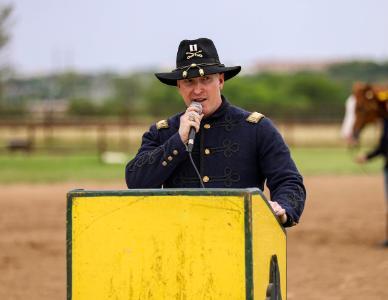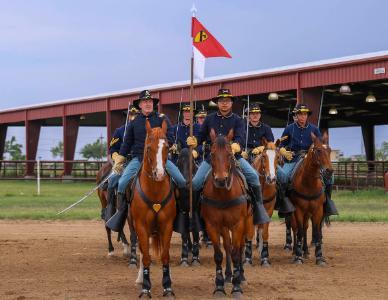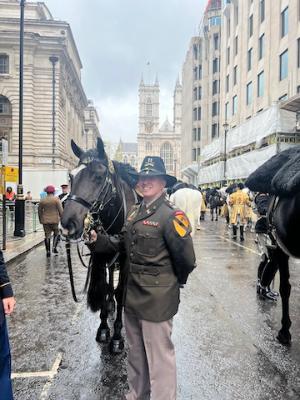VMI Alumnus Has ‘Best Job Ever’ as Commander in the Cavalry
LEXINGTON, Va. July 12, 2023 — Capt. Michael Gates’ ’17 former Virginia Military Institute roommate refers to him as the modern-day Teddy Roosevelt. Gates said that was a bit of an exaggeration and joked he could never be at Teddy Roosevelt’s caliber.
Instead, he is the commander of the Horse Cavalry Detachment for the First Cavalry Division in Fort Cavazos, Texas, formerly Fort Hood. He took command of the division at the beginning of June. Prior to that, he was the commander of the horse detachment at the 11th Armored Cavalry Regiment in Fort Irwin, California; a similar role to what he does now, just about a quarter to a third of the size in terms of horses, manpower, and missions, he explained.
 He says he has the best job ever.
He says he has the best job ever.
“Being able to represent a piece of military history while you're in active duty is an honor,” he said. “We get to choose our own team and choose the people who get to continue this, this tradition, this unbelievable tradition that's just romanticized today, but we get to go live that, not just in day-to-day, but in military ceremonies.”
But how does one with no equestrian experience come to command a mounted cavalry unit?
“I really just stumbled upon this world,” he said.
While he was working with 1st Sgt. Chris Stemple in the same company as engineers, Stemple left to become the 1st Sgt. at the horse detachment in the 11th Armored Cavalry and turned to Gates to be a commander.
“I originally turned it down because I didn't have any horsemanship experience or knowledge or anything,” he said. “And he was like, I just need a competent officer out here, I need a partner, I need somebody who I can rely on. I went out to the unit and I fell in love immediately. So I put my name in for the position.”
The next thing he knew he was given the position and heading out to California just as COVID-19 restrictions were subsiding. Even with his lack of horse experience, he said that, as an officer, he’s more focused on leading and those in that position tend to have less experience than the soldiers.
“I didn't necessarily need equestrian experience. I needed to understand our mission set and be able to utilize my soldiers and noncommissioned officers in roles that would allow the unit to thrive,” he said.
 He did receive training and won the intermediate level of the National Cavalry competition last year, taking first place in three events, second place in two events, and dominating the class. Events included historic cavalry tasks like mounted sabers, mounted pistols, military field jumping, and dressage.
He did receive training and won the intermediate level of the National Cavalry competition last year, taking first place in three events, second place in two events, and dominating the class. Events included historic cavalry tasks like mounted sabers, mounted pistols, military field jumping, and dressage.
“So, I’m getting there,” he said, modestly.
His unit is one of seven active duty Army units that work with horses, so it’s a very unique position — with less than 200 soldiers that do it, Gates shared.
“It is an extremely tight-knit community,” he said. “And all of them are hand selected to the teams. So as opposed to the rest of the Army where the team you’re dealt, is the team you got to war with. Out here we take only the best. You have to try out to be on the team. You can't have any infractions while you're on the team. It's a higher level of commitment and discipline. These soldiers give up most of their weekends to go to our traveling events. We also get more face time than 99% of the military does with the public. So they have to be as professional as possible.”
By far the coolest thing about his job so far was leading the envoy for the King of England’s coronation. Within two weeks of receiving his new post, he was asked to represent not only his unit but the United States Army and the cavalry to a foreign military unit. 
“Yeah, of course, it's in the job description, but the scale varies pretty wildly from local ceremonies to, I mean, that is probably one of the biggest international ceremonies that any of us will ever be able to see in person,” he said. “We were right there with the Household Cavalry mounted regiment, the King's guard as they were preparing to escort the King to Westminster Abbey.”
Gates said he and others were staged ahead of time and got to watch the King get escorted.
“We were maybe 100 yards from him. It was unbelievable,” he said. “It was so surreal … almost inception-like, dream state. Being there, living in the moment.”
Gates never held rank at VMI but he thinks that benefited him.
“I think it gave me the perspective similar to my soldiers, and it helps me be relatable and be empathetic to what a soldier is going through just from day to day, whether it's barracks life or standing in formation or you know, waiting for orders or not being in the decision-making process,” he said. “You don't realize how little gets put out as a leader until you have the perspective of a soldier. And that was incredibly important to my development as a leader. So the information dissemination, understanding motivations of a soldier and priority sets; they helped me in my decision making process as a leader today.”
Laura Peters Shapiro
Photos submitted by Capt. Michael Gates
Communications & Marketing
VIRGINIA MILITARY INSTITUTE
.svg)
.png)